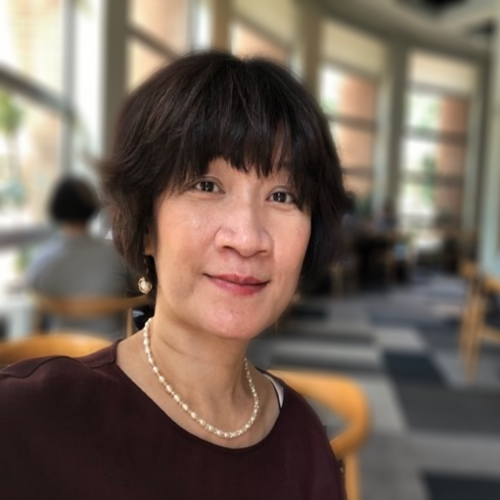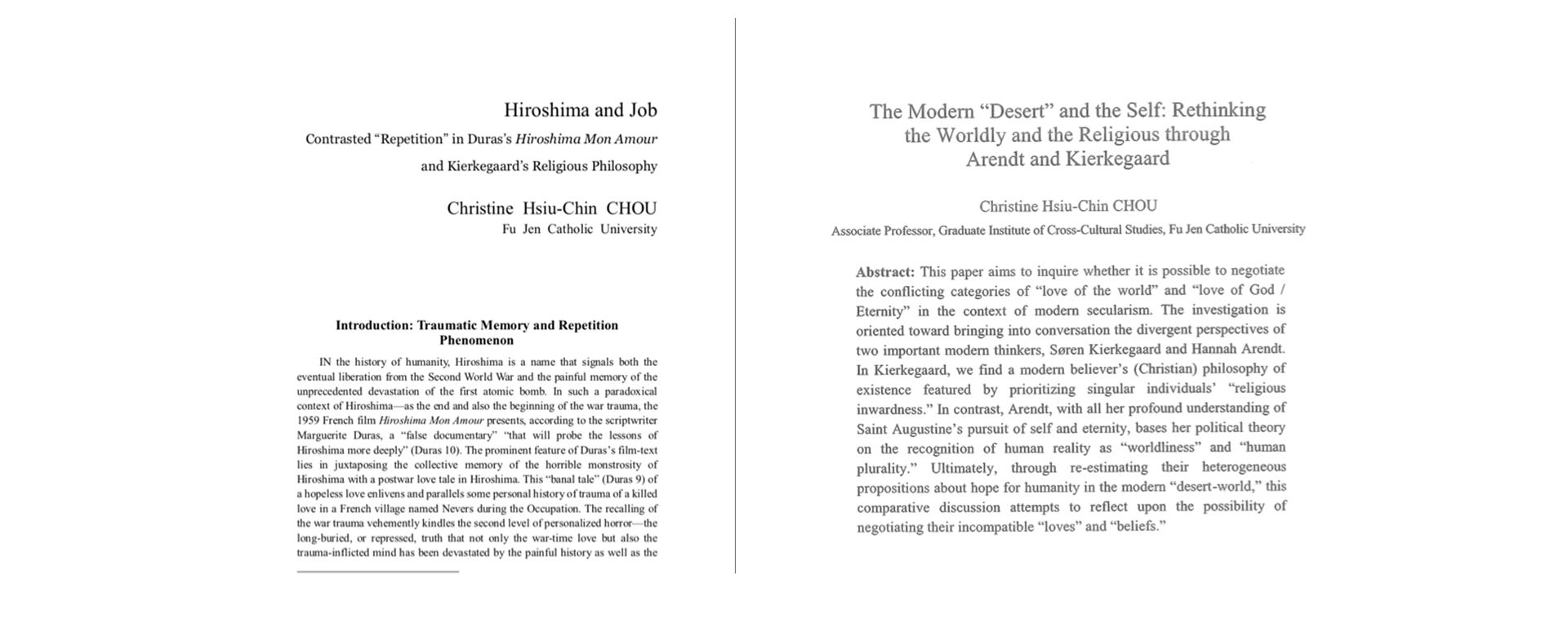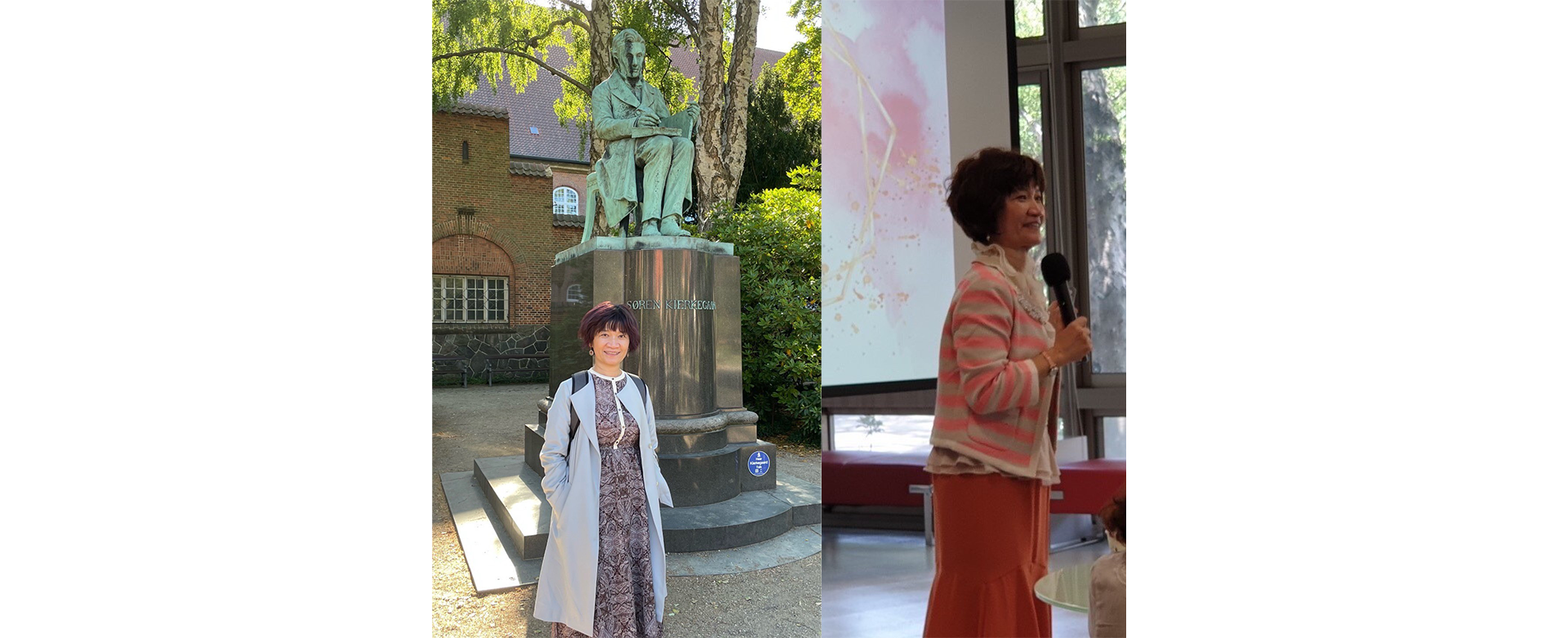Featured Scientist

Christine.H.CHOU, Ph. D.
College of Foreign Languages and Literatures
Associate Professor
Graduate Institute of Cross-Cultural Studies
Director of Graduate Institute of Cross-Cultural Studies (Aug. 2019 ~ now)
Vice Dean of College of Foreign Languages and Literatures (Aug. 2022 ~ now)
Inter-disciplinary Studies in Kierkegaard Scholarship
My research interests are generally located in the areas of literature, religion, existential philosophy, and hermeneutics. With special attention paid to the inter-discipline between these areas of study, my research work is primarily concerned with the relationship between the existential self and transcendental belief, especially in the context of modernity. In recent years, my interdisciplinary studies have been focused on the dialogue between the religious-existential philosophy of Søren Kierkegaard and other fields of discourse—literature, film, biblical hermeneutics, psychoanalytical theory, and (Hannah Arendt’s) secularist theory of politics. This interdisciplinary interest and endeavor in Kierkegaard’s scholarship has taken me to produce several outputs, mainly through developing critical perspectives based on Kierkegaard’s writings and thoughts on irony, repetition, self, despair, faith, and works of love which I applied to interpret fantasy literature, reflect on hermeneutics of biblical narratives, negotiate the confliction between Christian existentialism and modern secularism, and explore psychotherapeutic and/or existential possibilities related to traumatic memory, martyrdom, horror/fear of death, de-humanization of Holocaust, human apocalypse and survival hope, as well as the interchange between humanity and posthumanity.
The following two publications from recent years demonstrate examples of specific results of my Kierkegaard studies. Firstly, my 2018 journal (A&HCI) article titled “‘The Modern Desert’ and the Self: Rethinking the Worldly and the Religious through Arendt and Kierkegaard” attempts to engage in a dialogue between Søren Kierkegaard’s religious-existential philosophy and Hannah Arendt’s secularist political theory. Here, the primary goal is to reflect culturally on modern secularism along with Kierkegaard’s religious thinking. In the context of modern secularism, with the decline of faith in God, there seems to be an irreconcilable divergence between the views of reality and human existence based on principles of either worldliness or religiousness. It is thus tremendously intriguing to ponder the possibility of negotiating such categories of seeming contradiction as “love of the world” and “love of God/eternity.”
Aimed at such negotiation, this research endeavors to bring into conversation the conflicting perspectives of Hannah Arendt, whose philosophy of politics is premised on recognizing the truth of reality as human plurality and worldliness, and Søren Kierkegaard, whose Christian philosophy of existence is characterized by the prioritization of singular individuals’ religious inwardness. By reconsidering the contradictory assertions from these two modern thinkers about the hope for humanity—the Arendtian political promises grounded on love of the world versus the Kierkegaardian religious promises rooted in love of God, the whole discussion means to tackle whether such promises and loves are entirely incompatible or may actually co-exist within the self and for the world.
To look more thoroughly into their different propositions, the investigation aims to re-estimate Arendt’s metaphoric conception of “the modern growth of worldlessness” as a desert-world and her negative attribution of Kierkegaard’s project as one of “escapism” (particularly referring to his concerns with doubt and self) that serves to ‘make a desert out of the world’. According to Arendt, whose manifesto is that we are all worldly beings, Kierkegaard’s “escapism” is deemed as equal to a modern path to worldlessness. Thus, in spite of their divergence between worldliness and worldlessness, the study argues that between Arendt’s worldly and political agenda for transforming the modern desert-world and Kierkegaard’s religious project of what Arendt terms ‘the flight from the world to the self’ lies, in some sense, a common spirit of modern secularity. We may further hold that the two thinkers are to some extent both children of modern secularism. Certainly, this does not mean that they are essentially congenial thinkers of modernity, as Kierkegaard shares while Arendt turns away from the philosophy of St. Augustine’s manifesto— that we are creatures in the world but not of the world.
Ultimately, through negotiating the two secularist thinkers’ heterogeneous propositions about the hope for humanity in the modern “desert-world,” the study concludes with a somewhat eclectic thought that any exclusive embrace with either the worldly or the religious would turn out to be a true “desert” for the self in modernity.
Secondly, one of my studies in another journal (THCI) article published in 2022, with the title of “Hiroshima and Job: Contrasted “Repetition” in Duras’s Hiroshima Mon Amour and Kierkegaard’s Religious Philosophy,” aims to contrast two conceptions and phenomena of “repetition” which lead the post-trauma mind into the imprisonment of the eternal return, i.e., “blocked repetition,” of the painful past or, alternatively, into the double blessing of freedom and renewal of life. Through revisiting the contra-therapeutic phenomenon of repetition represented in Duras’s film-text, Hiroshima Mon Amour, the first target of investigation is set on the despairing type of repetition embodied in the heroine’s love life, namely, her “personal Hiroshima.” From this perspective, “Hiroshima” is deliberated as not only the emblem of traumatic memory but also a metaphor of victimhood of impossible forgetting/memory and the incurable repetition of historical pain.
Against this problematic kind of repetition, for which neither the psychoanalytic approach nor the Hiroshima writer, Duras, has a promise of cure, the second part of this researchmeans to scrutinize a different conception of “repetition” present in Kierkegaard’s religious philosophy, with special attention paid to his treatment of the afflicted but pious Job of the Old Testament as its “living” model. To Kierkegaard, Job represents the prototype of a trauma-devastated sufferer who chooses “repetition” as his way of living and becomes a healed, double-blessed, and liberated man of God, which is treated by Kierkegaard as “a principle of guidance to every man.” This understanding of Job is based on Kierkegaard’s modern, psychological, and profoundly religious and philosophical understanding of what “repetition” means to human existence. At the core of the Kierkegaardian repetition as exemplified by Job, the biblical man of religious piety, is the idea of passion for freedom, possibility, and life.
By examining the phenomenon and concept of repetition in terms of two different lived situations demonstrated respectively in the Hiroshima film and in Kierkegaard’s interpretation of Job, the whole study looks to reflect on the existential possibilities when “repetition” is unavoidable yet may not be hopelessly pathetic even for a death-preoccupied heart of pain. Ultimately, the study observes that contrary to “Hiroshima,” i.e., the “blocked repetition” of the horror of memory, Kierkegaard’s Job embodies the religious repetition that promises hope, as Job, out of religious piety, chooses to re-live not the past but instead “the event of the instant” that creates the present and the future as well as a life of freedom and possibility.

